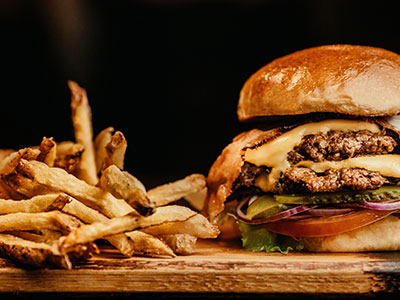
Eating healthy is a daunting task for many. I mean, how does one resist the cheeseburgers, the pizza, the cookies, the pumpkin spiced lattes? Well, some don’t—instead they incorporate these generally unhealthy, yet mouth-watering foods into their diet on occasion; they eat them in moderation. But others eat all of the cheeseburgers, the pizza, the cookies, and the lattes; some fail to resist and others indulge without thinking twice. In either case, those that give into these comfort foods and make them a staple part of their diet often suffer the consequences. A poor diet can be detrimental to our health in a multitude of ways: it can lead to tiredness, poor performance at work, obesity, high blood pressure, high cholesterol, depression, type-2 diabetes, and depression. And still, the list goes on.
By now, everybody is aware of these harmful consequences of a poor diet, whether they eat well or they eat poorly. But another important factor of our health and wellbeing gets pushed to the side and hides in the shadows: stress. However, now it is demanding attention, as a new study “Gender-based differences in host behavior and gut microbiota composition in response to high fat diet and stress in a mouse model” conducted at Brigham University shows that stress may be just as unhealthy as a really bad diet—specifically in females.
“Stress can be harmful in a lot of ways, but this research is novel in that it ties stress to female-specific changes in the gut microbiota,” BYU professor of microbiology and molecular biology Laura Bridgewater explains of the study. “We sometimes think of stress as a purely psychological phenomenon, but it causes distinct physical changes.”
Bridgewater combined efforts with researchers at Shanghai Jiao Tong University in China to conduct a study with male and female mice, in hopes of examining connections between obesity, stress, gut microbiota (microorganisms vital to digestive and metabolic health), and mood disorders. To start, the team exposed half of the males and half of the females to a high-fat diet. And after 16 weeks, all of the mice were exposed to mild stress for 18 days. Then, it was time to assess. The researchers extracted microbial DNA from the mice fecal matter (which they also did before the stress test administration) to test how their gut microbiota changed; and they also measured changes in anxiety based on the mice’s travel patterns.
The research team was fascinated by the differences they found between the two genders: male mice that were put on the high-fat diet showed greater anxiety than females on the high-fat diet, as well as decreased activity in response to stress; but only the female mice showed a shift in the gut microbiota composition, as if they were on a high-fat diet, when exposed to stress.
This test may have been administered on mice, but the research team believes stress could have similar effects on humans and also notes the importance of gender inclusion in research. “In 2014, the United States National Institutes of Health (NIH) mandated sex and gender inclusion in all preclinical animal and cell culture studies funded by the agency. This study illustrates the importance of that mandate, as diet and stress produced different impacts on the gut microbiota, on anxiety-like behaviors, and on locomotor activity in female and male mice,” the authors and researchers conclude in their paper.
While it’s crucial that we pay attention to our diets and get the proper nutrients our bodies demand, it is also important we pay attention to stress factors and learn how to better handle them. Because, as this study shows, stress may have harmful effects on our body similar to those of poor or high-fat diet.
Source: Brigham Young University. “Stress May Be Just As Unhealthy As Junk Food To Digestive System.” NeuroscienceNews. NeuroscienceNews, 16 October 2017.
<http://neurosciencenews.com/stress-digestive-system-7747/>.
Original Research: Full open access research for “Gender-based differences in host behavior and gut microbiota composition in response to high fat diet and stress in a mouse model” by Laura C. Bridgewater, Chenhong Zhang, Yanqiu Wu, Weiwei Hu, Qianpeng Zhang, Jing Wang, Shengtian Li & Liping Zhao in Scientific Reports. Published online September 7 2017 doi:10.1038/s41598-017-11069-4
Let’s keep in touch! Sign up to receive our newsletter:
Start a Relationship with An Exceptional Counselor
- Skilled and caring professional counselors
- Accepting all major and most insurances
- High-touch customer service & premium benefits
- Same- or next-day appointments
- Ultra-flexible 23.5hr cancellations













